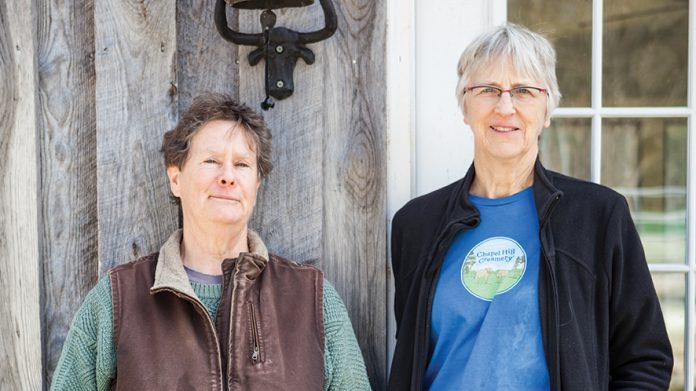Stepping onto Flo Hawley and Portia McKnight’s Chapel Hill Creamery, a 47-acre dairy farm on the outskirts of Chapel Hill, there is an overwhelming sense of calm. Maybe it’s the tree-lined, winding gravel road that leads back to the property.
Maybe it’s the sense of remote solitude. Or maybe, as Portia points out, it’s the soulful eyes of the 30 Jersey cows staring back at you. Whatever it is, what Flo and Portia have created on this little plot of land generates happiness—both for the farm’s residents and for the city at large.

Back in 2000, fueled by a desire to be closer to the production of their food, the two women, then employees at Whole Foods, decided to pursue a career in cheesemaking. Portia spent nine months working on a nearby dairy farm, and the pair attended a weeklong Canadian cheese school in the spring of 2001.
They started with one Jersey cow—named Miss Ada after a previous owner of the farm—and by the summer of 2001, they had a herd of nine untamed Jersey cows.
“As soon as we got the cows, they were producing milk; so within a day or two, we were making cheese,” Portia recalls. “Our first cheese was feta. When we went to cheese school up in Canada, the thing that both of us remembered the most that the instructor said is that feta is very forgiving.”
While the feta was aging, the women made mozzarella and, hoping to capitalize on the plethora of seasonal tomatoes available, took it to a nearby farmers’ market. They sold out completely by 10 a.m., and Chapel Hill Creamery was officially in business.
They soon started making Hickory Grove, an aged monastery-style cheese with a washed rind that has a mellow, buttery taste. This style of cheese is typically named for the monastery where it’s made. With no monastery to speak of, Flo and Portia named their version after the Hickory Grove Missionary Baptist Church that sits in front of the creamery.

Over the years, the women slowly built the business to the impressive operation it is today with a closed herd of 30 cows that were all bred at the farm and a staff of nine. Jersey cows were chosen, first and foremost, for the high percentage of butterfat content in their milk. But there are a number of factors that make them the best choice for a dairy farm.
“They’re very fertile,” Portia says. “If they’re not fertile, they’re not much good as a dairy cow. They have to have a calf. So Jerseys have really maintained their fertility as the breed has developed.
[And] they’re smaller, which means that they’re more heat tolerant. Also Jerseys’ bone structure is a bit different, and they very seldom require assistance in calving. And last but not least, they have the most soulful eyes.”
The Jersey cows are milked twice daily, and the milk—roughly 45 pounds per day per cow—is used within 48 hours to make cheese. The creamery’s core products are the Carolina Moon, a Camembert-style cheese that is aged for four to eight weeks; the Calvender, a drier, nutty variety inspired by Asiago that ages for seven months and won Best of Show at the North Carolina State Fair three times; and the Hickory Grove.
Seasonally, varieties of mozzarella, feta, and farmer cheese are offered. At the peak of the season, Flo, Portia, and their dedicated staff produce 1,200 pounds of cheese per week, which they sell at three local farmers’ markets, through Community Supported Agriculture (CSA) delivery, at specialty retail shops throughout the Research Triangle (including Whole Foods), and directly to wholesale accounts, which comprise a host of area restaurants.
Local chefs throughout Chapel Hill sing the praises of both the cheese and the women behind it. Once you sample their farm-fresh cheeses, you’ll be singing their praises, too.





